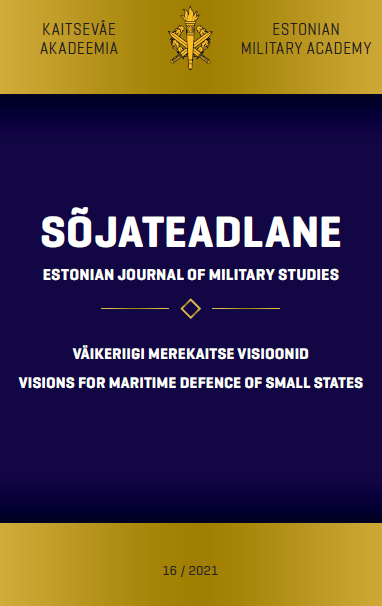EESTI MEREVÄE ÜLESANNE PEAB OLEMA PIIRATUD MEREALA VALDAMINE, MITTE VALDAMISE TAKISTAMINE
ESTONIAN NAVY SHOULD STRIVE TOWARD LIMITED SEA CONTROL INSTEAD OF SEA DENIAL
Author(s): Grigori GavrilovSubject(s): International relations/trade, Security and defense, Military policy, Comparative politics, Peace and Conflict Studies
Published by: Kaitseväe Akadeemia (KVA)
Keywords: Estonian navy; Sea control; naval theory; war on sea; naval warfare;
Summary/Abstract: Despite the emergence of new “revolutionary” technologies, the reality of war seldom changes instantly and is more often than not an evolution, rather than a revolution. The same applies for warfare in general, and naval warfare in particular. The first theorists of naval warfare (e.g. A. T. Mahan, J. Corbett, P. H. Colomb, S. Makarov) wrote about the age of sail at a time when wooden-hulled ships and smoothbore cannons had not yet lost their relevance in naval warfare. Still, the most significant statements of the XIX century thinkers stood the test of time and remain relevant even at the age of nuclear propulsion and supersonic missiles. Most naval theorists generally accept two maxims. The first, established already by naval thought pioneers, states that the ultimate purpose of all operations at sea is to influence the events on land. The second maxim focuses more specifically on conducting war at sea. In general terms, it describes two different approaches to naval warfare. The first is a pursuit of sea control. Sea control is a situation where one side is able to use the sea for achieving its objectives, either as a transport medium (for both troops and goods) or a projection of their power from the sea (i.e. amphibious operations or strike warfare). The second is a pursuit of sea denial. It can be described as a situation that precludes the use of the sea by an opponent, without necessarily allowing oneself to use the sea instead. It is important to understand that sea control and sea denial are not antipodes. If one side achieves sea control, the sea is automatically denied to the other belligerent. However, successfully achieving sea denial does not automatically give one the ability to use the sea freely for personal purposes. It is an important rationale for the subsequent discussion.
Journal: Sõjateadlane
- Issue Year: 2021
- Issue No: 16
- Page Range: 9-33
- Page Count: 25
- Language: Estonian

